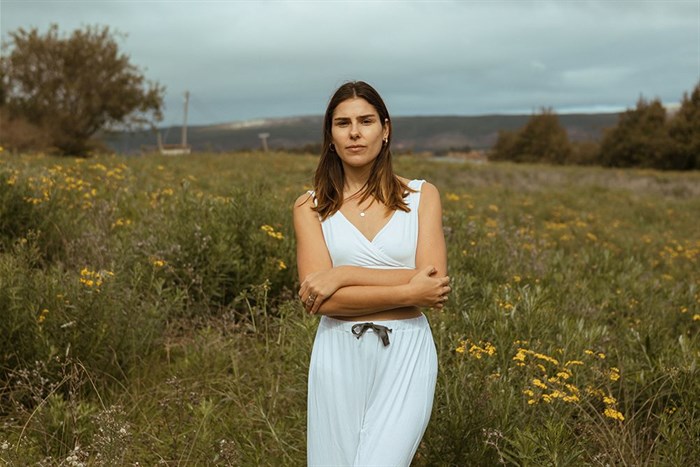#WomensMonth: Michaella Menin, founder of Myboombra, chats career pivots and the “Super Mom" myth
Not only a maternity clothing brand of intimates and loungewear, Myboombra aims to inspire and educate women about all things motherhood, especially breastfeeding, and hold space for women on the often challenging pregnancy/postpartum journey.
For Women’s Month we chatted to Menin about how she made the shift to start her own business, how we still need to support working mothers in South Africa and her top tips for other women wanting to start their own business.
How did you navigate the shift from working at a corporate job to starting your own business?
I was working an ideal job as a digital marketing manager for a consulting company in the Netherlands. My partner and I moved back to South Africa from Europe post Covid when I found out I was pregnant and luckily kept our jobs as remote employees.
It was the perfect set up on paper, but as I got further into my pregnancy, I started resenting my work.
My maternity leave was coming up, so I pushed to finish up and see how I felt after the baby arrived.
After an intense postpartum period with a colicky baby, PPA and exhaustion, I couldn't put off going back to work anymore. I was six months postpartum when I started my first month back, and I was already dreading sitting down at my laptop.
A few months before, I had written down a business idea on my iPhone for a sustainable, comfy maternity brand. I felt that alot of the maternity fashion in SA was poor quality and only lasted a few months.
So, between my corporate work hours, I started to write down a business plan, source sustainable fabrics and get some samples made. I decided to test my garments in the market by sending out free samples to all the moms in my local community groups and got feedback.
Once I had a few paying customers and some great reviews, I felt confident enough to take a risk and build my own business, on my own terms, where I could be present for my son and my family.
I didn't need any upfront capital to start my business because I was able to build my own website, do all my own marketing and sell small batches to cover my next inventory costs.

What inspired you to make this change?
Although the company I was previously working for had a great culture and were accommodating, I just couldn't get around the fact that I had to sit and pump milk for my baby who was crying in the other room while I had meeting after meeting.
I couldn't face the fact that someone else was raising my son and I was devastated at how little of myself I could give my son at the end of the work day. Everything in my body wanted to be with him and hold him when he cried.
So, I decided it would be better to take a bit of an income cut as I built a flexible business than be stuck to my laptop all day.
Can you give us some insights into Myboombra's sustainability practices?
First of all, the fabric I use for all my garments are made from 95% Bamboo and is certified with Rainforest Alliance.
Secondly, I get my undies and loungewear made 10 minutes from my home in Cape Town by a CMT called The Sewing Cafe.
What I love about them is that they upskill and train women in the townships on how to sew and hire them. Lastly, all of my packaging is 100% compostable, as I believe that if you say you are 'sustainable', you should practice what you preach.
I am very aware of some brands using 'greenwashing' in their marketing, and I am not interested in being one of them.


As a female founder, what are some of the biggest challenges you have faced, and how did you overcome them?
I think being a woman in business already has its challenges, but being a mom in business is especially difficult. From sleep deprivation and managing priorities with a small baby, to the sheer mental load of taking on a new venture at this stage in my life, it has felt like a juggling act I can't get right 100% of the time. Balls will be dropped.
I wrote a blog post a while back about how society often celebrates this fictional character called the 'Super mom', who has a great job, spends time with her kids and maintains a clean and organised household.
The expectations placed on women to be great at multitasking and "do whatever a man can do" is a hoax.We are spreading ourselves so thin most of the time and getting burnt out in the process. So, I will end off by saying the biggest challenge I have faced is identifying the fewest work tasks a day that have the biggest impact on my goals, and letting the rest go.
What do you find most rewarding as well as challenging about creating your own business and working for yourself?
Being able to design my own workday. It's amazing that I can carve out time when I am most creative and energised to buckle down into my work, but it is definitely a skill that requires discipline. This can be especially challenging while working from home and juggling kids.
Being a solo entrepreneur means no one sets you goals or timelines and you are only accountable to yourself. If something doesn't get done, it is ultimately you who sacrifices your business success.

What would you like to see shift when it comes to supporting working moms, both in the workplace and when working for themselves?
I could write a book on this, but I will try to pick a few things that I believe will help mothers in business.
Firstly, we need government support to put fair maternity policies in place for mothers that acknowledge the physical and mental risks we face, especially earlier on in motherhood.
Our PPD rates are rising globally and more studies are finding the association between poor maternity leave policies and postpartum depression.
A study by Arch Womens Ment Health found that "Working mothers, who today represent a more significant part of the workforce than in previous generations (Buzzanell and Liu 2007), are at greater risk of postpartum depression due to sleep deprivation, the demands of caring for an infant, and the inability to engage in health promotion activities because of competing demands from home and work (Selix and Goyal 2015)."
At the very least, we should have six months to a year of paid or partially paid maternity leave – for all of our employment sectors whether formal or informal. And in some countries, like the UK, the government will give self-employed mothers maternity allowances.
Secondly, I believe we have a very poor working culture in South Africa that places the importance on hours worked versus performance. In some countries, like the Netherlands, new mothers and fathers are legally allowed to drop down to a 4-day work week until their kids turn eight years old.
Because of their outcomes-based working culture and enhanced employee wellness, they are able to sustain the same level of business performance. There are also many companies that are happy for their employees to work from home when need be.


Lastly, I can't believe we are still so embarrassed about breastfeeding and pumping in the workplace. I've heard countless stories about new moms who are already stressed and suffering from sleep deprivation who go back to work and are asked to go pump in the bathroom because it is inappropriate. This should be a legal offence for businesses to inhibit where or how often a mother can pump.
Every workplace should have a comfortable and clean area for mothers to feed or pump and a storage fridge for them to keep the breast milk until home time.
How do you balance working for yourself and being a mom to a growing family?
Honestly, I don't get it right most of the time. In this season of having a toddler and being pregnant, I am prioritising my family's well-being over profits. I am in a privileged situation where my partner can step in and cover household costs. It also helps that a lot of my business is automated and I have designed it to be quite hands-off so that I have a steady-ish income each month with little effort.
I would recommend to any mom wanting to jump from a salaried job into self-employment to look at your business model very carefully and choose something that requires as little human effort as possible.

What advice would you give to other women aspiring to start their own business?
Test your business out in the market before you quit your day job. You don't have to be making millions to jump into your own business fully, but just be sure there is already demand out there.
Use this time to test and iterate on your product or service too. Allow others to be brutally honest about what you are providing so that you can get as close to perfect before you take the leap.
I'd also say, start small and simple. If you need to a lot a lot of people or spend a lot of capital on your business upfront, you will put yourself in a riskier position.
And something that I know I will get a lot of slack for saying, but here goes...don't hire a marketing agency from the get-go. Learn how to sell your product or service before you rely on others, it will be the biggest investment in yourself, but the most rewarding if you are able to generate your own sales before you scale.
What does Women’s Month mean to you, both personally and professionally?
I believe women are the backbone to society. We raise and nurture future generations, which means we hold a lot of power in defining the ideals and values of our time.
I am in awe of the passion and purpose women in business hold, many as advocates for the environment, human rights and making the world a safer, better place to live. I love that we are fueling the movement to step away from a 'profits above all else' mindset and towards a more sustainable approach to business.

What's next for MyBoombra?
We started out making a comfy breastfeeding friendly bra that has a small cult-following because of how intentional I was around testing it on many different bodies.
My dream is to stock a fully sustainable capsule wardrobe with the same level of comfort and fit as the bra.
I'm hoping that each of my products are designed so thoughtfully for mothers that they are able to wear them through all the stages of womanhood in my efforts to cut down fast-fashion waste in the maternity industry.




































